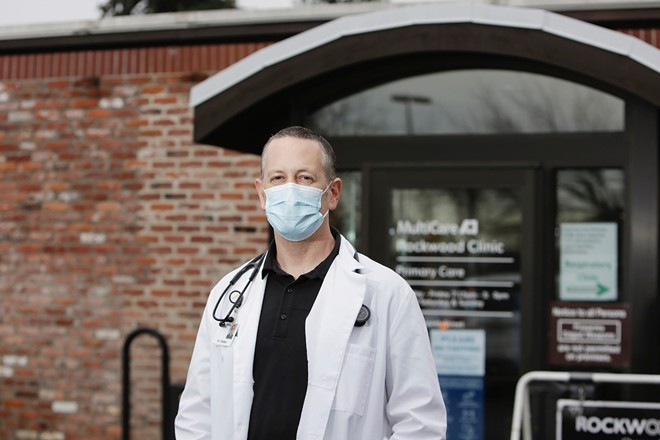
Under a new clinical trial, another COVID-19 vaccine is closer to becoming a reality, and hundreds of Inland Northwest volunteers can help researchers by volunteering to take the shots.
A MultiCare researcher in Cheney has been selected to lead the only phase 3 COVID vaccine trial in the region as part of the nationwide testing of a vaccine developed by Novavax.
Since 2007, Dr. Jonathan Staben has helped lead research on multiple vaccine trials at MultiCare Rockwood Cheney Clinic. When MultiCare acquired Rockwood Health System in 2017, Staben and others partnered with MultiCare’s Institute for Research Innovation based in the Puget Sound area to continue their research. That experience is partly how his clinic was selected as the only site apart from the University of Washington to test out the Novavax vaccine.
Up to 300 people can participate in the trial, and unlike most placebo trials where you have a 50/50 chance of getting the actual vaccine or a placebo of saline fluid, two-thirds of participants will receive the actual vaccine for this trial.
HOW THE VACCINES WORK
The vaccines being developed and those already being distributed are designed to help the body target the spike protein on COVID-19 virus cells.
The spike protein helps the virus break into and enter your body’s healthy cells so it can then take over and use your cells to replicate itself.
“All of these vaccines are trying to train your body, for the most part especially with the ones we’ve all seen, to recognize the spike protein,” Staben says.
The two vaccines that have already been approved for emergency use by the Food and Drug Administration, produced by Pfizer and Moderna, use a brand new mRNA technology that essentially provides directions to your body to create the spike protein on its own, Staben explains. Your body then immediately recognizes that as a threat and attacks, creating antibodies.
Novavax’s vaccine is more like those that have been used over previous decades to prevent illnesses like hepatitis. The protein that the body needs to attack is created in a lab setting (not by the body), then injected via the vaccine along with an adjuvant that helps the body’s immune response to the foreign protein. Similarly, your body then recognizes the threat and creates antibodies, which later help you defend against infection from the virus.
Growing the proteins in the lab takes longer than creating the mRNA vaccines, which is partly why this vaccine is reaching its phase 3 trial later than the two that are already approved, Staben says.
Similar to Pfizer and Moderna’s vaccines, the Novavax vaccine requires two doses. None of those options contain the entire virus, so you cannot get COVID-19 from them, but some cold-like side effects are possible while your body reacts to the foreign proteins.
Significantly, the Novavax vaccine doesn’t require that doses be kept at incredibly low temperatures until they’re ready for use, as the Moderna and Pfizer options do.
“This vaccine doesn’t have any cold storage requirements, it’s stored at normal fridge temps,” Staben says. “So this will be a lot easier down the road to get in rural areas, Third World countries, that kind of thing.”
Staben says he’s been on calls with officials planning for the country’s vaccine roll-out and leaders have noted that it’s key to have a mix of options, especially those that can be stored without specialized equipment.
HOW TO PARTICIPATE
Volunteers can signal their interest in participating by going through MultiCare’s website at go.multicare.org/covid-vaccine.html. You do not need to be a MultiCare patient, and the available spots are expected to fill up quickly.
Generally, researchers are hoping to enroll people from a variety of age groups, racial groups, and health backgrounds.
While most of the in-person stages of participating in the trial will happen within the first three months, researchers will check in with participants over the course of 24 months to complete the study. Emergency-use authorization could potentially come soon after enough participants have been given the second dose of the vaccine.
“There are several key factors we’re kind of targeting here,” Staben says. “First they have to be over 18. They have to be medically stable, and that would be determined by our staff, especially me as the principal investigator.”
Participants can still have medical problems, such as diabetes or hypertension, Staben says, as studying the vaccine’s safety for all types of people is one of the goals.
“It is important to study these in people that have health care problems, not just young, healthy people,” he says. “We just want people who are not medically fragile and undergoing frequent changes in their medications and so forth.”
People that are over 65 are important to enroll, Staben says, as well as those who may have risk factors for getting COVID, such as those who work in crowded industrial plants or as first responders.
Researchers are also hoping to enroll people from racial backgrounds that have been historically underrepresented in clinical trials — in part due to distrust built over time by the medical system’s mistreatment of minorities — and whose communities have been disproportionately impacted by the pandemic.
“That would include African Americans, Native Americans, Asian Americans, Latinx populations,” Staben says.
You don't need to meet all of those factors that researchers are looking for, but those are things they'll look for as they select participants.
A few things may disqualify people from participating, including if you’ve already tested positive for COVID (from a PCR test, not a rapid test). However, while participants will be tested for COVID-19 antibodies, a positive antibody test wouldn’t disqualify them from the study, Staben says. It’s important to note that participants won’t be told of the results of those tests, though, he says.
Additionally, if it’s likely you’ll be among the groups with early access to the other vaccines that are already approved, you may just want to wait your turn for that vaccine rather than trying to sign up for this trial, Staben says.
“We don’t want someone enrolling in the trial and then having something offered to them and feeling like they can’t get it,” Staben says.
Staben and others working on the trial will hold a virtual town hall starting at 5:30 p.m. Tuesday, Jan. 12, where you can learn more about the trial. To sign up for that event register here.
More information about the Novavax vaccine can also be found here.























